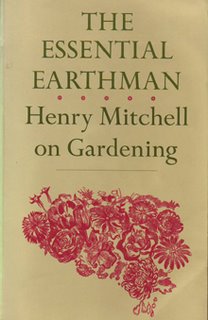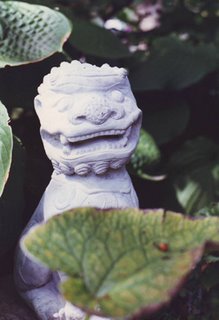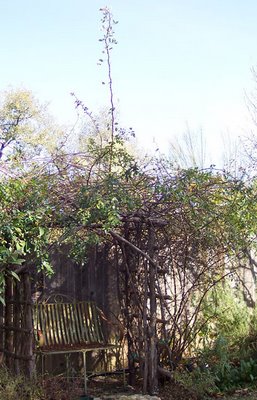
When Carol chose The Essential Earthman for her Garden Bloggers Book Club, I was pretty sure the garden bloggers would enjoy it, but wondered what an average new gardener would think about it. Henry Mitchell started writing his garden columns in the mid-1970’s, around the time that Philo and I bought our first house. Back then, the gardeners we knew might have a basic reference book or two, but were likely to ask friends for advice or use the library to look up plants and their care. Learning how to grow things came with homeownership, stick trees abounded, and the front yards in some neighborhoods became startlingly similar, as neighbors grew and passed around divisions of the same variegated hostas, orange daylilies, phlox and iris.
If you could remember a few botanical names, liked to mail-order unusual plants and were building a collection of garden books, you became known as a ‘plant nut’, and I earned the label while gardening at our second house in the eighties. At some point, I left the ‘how-to’ books on the library shelves, taking home writers like Allen Lacy and Henry Mitchell, whose detailed observation, passion for plants and personal garden philosophy outweighed many tomes of instruction.
Twenty years later, anyone can Google, so no one needs to search through 14 or 15 books to identify a single perennial. News stories tell us that few people will wait for shrubs or trees to grow – they flip the house after a short stay. I read that half the homes in the US use a lawn service - do the owners ever learn the names of what's in their yard? How can gardeners find a personal style of gardening when they learn about gardens from television? Those instant makeover garden shows instill the personality of the TV host, not the owner.
There also seems to be an undercurrent of antagonism in horticulture news – homeowners associations attack native plant advocates, lawn afficianados & and neat freaks square off with organic gardeners, and those newly converted to ecology seldom tend their own gardens, preferring to criticize everyone else’s instead.
It appears that a garden is now an investment; a garden is now a stage on which to display wealth; a garden is now a political battlefield.
 Along comes Carol, sending today's gardeners out to find The Essential Earthman. I cannot imagine Henry Mitchell looking at his lot as real estate – this man inhabits every square inch of his garden! He jams the plants in too closely, grows difficult, exotic plants from all over the world, starts trees from seed, succumbs to zone-envy, takes an entire day to get three tomatoes planted, and is overcome by the beauty of roses and iris. He speaks of the impact of a single marigold in a sea of petunias. He rejoices in small triumphs like one perfect daffodil in bloom, he putters and fusses with his stock tank, gloats over his Chinese bronze dog, and loses track of time. He encourages us not to lose heart as we deal with unpredictable weather, because “It is defiance that makes gardeners”.
Along comes Carol, sending today's gardeners out to find The Essential Earthman. I cannot imagine Henry Mitchell looking at his lot as real estate – this man inhabits every square inch of his garden! He jams the plants in too closely, grows difficult, exotic plants from all over the world, starts trees from seed, succumbs to zone-envy, takes an entire day to get three tomatoes planted, and is overcome by the beauty of roses and iris. He speaks of the impact of a single marigold in a sea of petunias. He rejoices in small triumphs like one perfect daffodil in bloom, he putters and fusses with his stock tank, gloats over his Chinese bronze dog, and loses track of time. He encourages us not to lose heart as we deal with unpredictable weather, because “It is defiance that makes gardeners”.I hope he will be an antidote to these depressing news stories, and that H.M.'s words will be like oxygen for those who still want genuine, experimental, personal, overreaching, messy, ridiculous gardens, not reading the pages on fast-forward, but savoring his thoughts, like this one:
... it is the Spectrum not the color, that makes color worth having, and it is the cycle, not the instant, that makes the day worth living...
Henry warns us, “ Your garden will reveal your self. Do not be terrified by that…”
I pondered those words in June as I clicked ‘Post this blog entry’ for the first time, knowing that once seen, my garden was sure to give me away, revealing my self.

I believe in Henry Mitchell’s kind of garden philosophy. His plant-specific advice, however, was written a quarter-century ago, for gardeners living far from Austin, and being under that influence got me in a bit of trouble here.
By .., I’d read and reread H.M.’s description of the wonderful yellow ‘Mermaid’ rose. Deer ate the roses in my own neighborhood, and I couldn’t grow any, but my friend Diane needed a climbing rose for her large new wooden arbor. I talked her into buying a ‘Mermaid’ just so I could see this rose in full glory. Henry did allow that it could be a 'large' rose, but Diane’s plant went way past “Mermaid’-size, way past ‘Manatee’ size, all the way up to Rosa ‘Orca’.
No comments:
Post a Comment